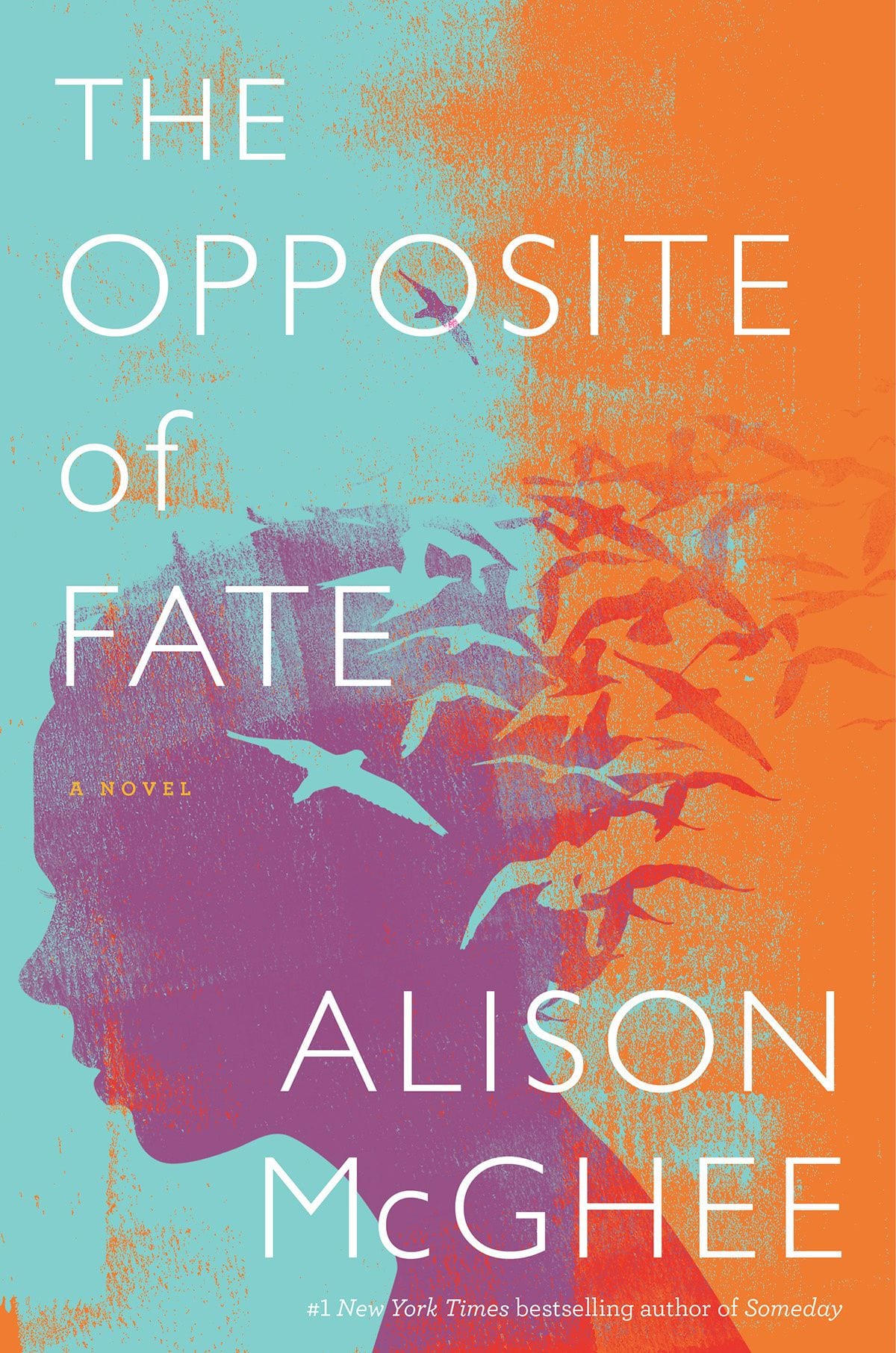
Alison McGhee’s sixth adult literary novel, The Opposite of Fate begins when 23-year-old, upstate New Yorker, Mallie emerges from a year and a half long coma to find her life in pieces. Her estranged mother is dead, her beloved boyfriend Zach has fled, and her neighbor, William T., her surrogate father, is grumpier than normal. What’s more, he’s withholding basic facts about how she ended up in a coma in the first place.
Malli’s story spends the first 50 pages trying to pry the truth out of William T. She eventually learns that she was raped, beaten, rendered unconscious, and impregnated. At the urging of Mallie’s mother’s fundamentalist church friends, the baby was then brought to term, c-sectioned from her, and fostered out.
Disoriented yet determined, Mallie sets out to put the pieces of her life back together to form a picture she can live with. On her journey through currents of psychological dissonance, she centers herself when overwhelmed using a technique Zach taught her: to think of just one hard thing, one impossible thing, and then one good thing about any given situation. This frame will be used in reviewing this work which, despite significant flaws in execution, humanizes the abortion issue in a way that is unexpected and heartening.
One Good Thing—Mallie
Post-coma, Mallie is reminded of her prior volunteer work as a massage therapist to battered women at a shelter:
“Those women’s stories were the hardest, both to listen to and to ease. Violence and fear ingrained itself into muscle memory, even into bone, and the women were often afraid of even gentle touch. They had to learn how to re-enter their own bodies, how to inhabit their own skin, how to own themselves” (110).
Mallie must relearn these things as well as she returns to sentience, after lying intestate on a hospital bed for 16 months.
In her early days awake, she’s infantilized by those around her. William T.’s bitterness and ceaseless ruminations over what has happened to Mallie oppresses her. Meanwhile, the void created by Zach’s absence eventually goads her into taking flight in search of him. Though Mallie ends up journeying across the country, her thoughts stay close to home, who she used to be, and how she can be whole again.
Mallie’s journey toward cohesion is a cognitive triathlon. Refusing to be cowed by the unknown identity of her rapist, Mallie invents a character for him; in doing so, she bravely empathizes with, then circumscribes him. Mallie’s former profession as a masseuse becomes a controlling metaphor for the way she has to massage back to life the dead connections between herself and her loved ones.
In her recovery, Mallie discovers the mystery and vulnerability inherent in intimacy. At the novel’s end, this knowledge empowers her to do the unthinkable.
The Opposite of Fate is an enigmatic, even ponderous title. Still, through Mallie, McGhee leads us toward her riddle’s radically simple solution of a victim becoming a victor by choosing the life she has been given.
An Impossible Thing—William T.
Though Mallie is able to wrest herself away from a dour William T., the narrative isn’t. McGhee weds herself unnecessarily to chapters alternating between Mallie and William T., despite his blandness. The character is difficult to enjoy because of his lack of definition outside of his relationship with Mallie. To get over obsessing with Mallie’s unexpected recovery and subsequent flight, William T. develops a hobby; but these repetitive scenes read out-of-character.
Notwithstanding, William T.’s arc shows how a family member has to recover from injustices inflicted upon their loved one. Through William T’s brooding, McGhee is earnestly limning oft-ignored victims of pro-life ideological influence: the men of the women forced to have unwanted children. But these merits aren’t enough to justify William T.’s constant and cumbrous presence. Especially since Mallie does the heavy lifting and could have done more if William T. had been relegated to a side-character.
A Hard Thing—McGhee’s Style
McGhee favors repetition over figures of speech to depict character internality. Given that her characters are plainspoken working people, this might make sense. However, the constant reciting of agreed-upon facts reads almost liturgical. Doctors tell William T. to “let Mallie lead the way”. This becomes a kind of refrain, but this, along with numerous other repeated phrases, makes the book’s music skip like a scratched disc. The choice to have William T.’s moniker repeated each time he’s mentioned by every character is further evidence of this.
As is particularly true with the ‘dark bird’ motif, the recurring visuals become opaque with overuse.
Finally, the narrative’s efforts at suspense rely too heavily on the author withholding information. Consequently, the characters are unrealistically reticent. As a contrast, consider Colson Whitehead’s playbook in
The Underground Railroad. Whitehead lights the fuse of suspense with a sentence declaring a catastrophe is soon to come. In response, our eyes can’t help but race to find out how disaster transpires. In The Opposite of Fate, the withholding of information—particularly in the opening third— exasperates a reader’s patience.
Despite these issues,
The Opposite of Fate is a timely work and not only because abortion rights, even in instances of rape, are under national threat. The novel feels bleak in the ways one expects small communities across America to feel in our zeitgeist, the broken bonds of family and societal fallout leading to odd congealing of friendships where people find belonging and significance. Neighbors, friends, and cousins function as parents. A patchwork of reciprocal care forms between the aged and young adults with children, the middle is generation dead or absent.
As individuals within these groups sustain wounds and confront choices about moving forward, group cohesion is shaken. In
The Opposite of Fate, a connection in an improvised family unit is ultimately maintained because of each character’s commitment to honor individual choice in how to reframe trauma.

